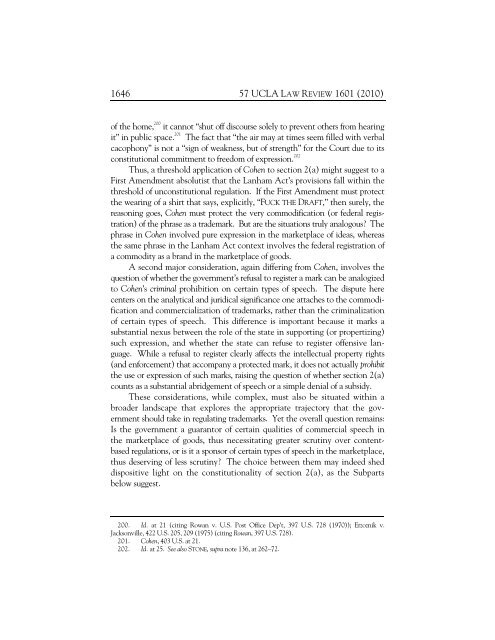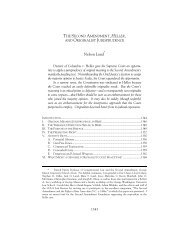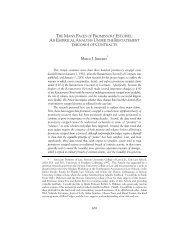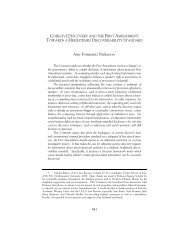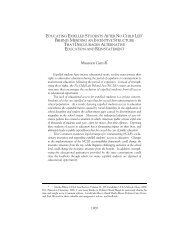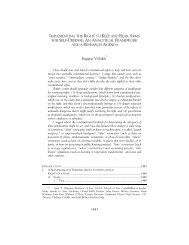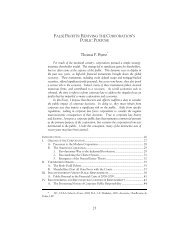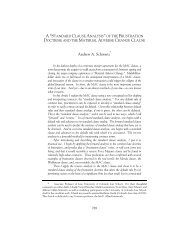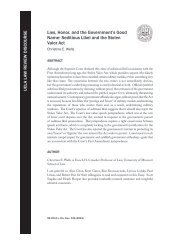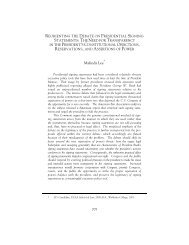Sonia K. Katyal - UCLA Law Review
Sonia K. Katyal - UCLA Law Review
Sonia K. Katyal - UCLA Law Review
You also want an ePaper? Increase the reach of your titles
YUMPU automatically turns print PDFs into web optimized ePapers that Google loves.
1646 57 <strong>UCLA</strong> LAW REVIEW 1601 (2010)<br />
of the home, 200 it cannot “shut off discourse solely to prevent others from hearing<br />
it” in public space. 201<br />
The fact that “the air may at times seem filled with verbal<br />
cacophony” is not a “sign of weakness, but of strength” for the Court due to its<br />
constitutional commitment to freedom of expression. 202<br />
Thus, a threshold application of Cohen to section 2(a) might suggest to a<br />
First Amendment absolutist that the Lanham Act’s provisions fall within the<br />
threshold of unconstitutional regulation. If the First Amendment must protect<br />
the wearing of a shirt that says, explicitly, “FUCK THE DRAFT,” then surely, the<br />
reasoning goes, Cohen must protect the very commodification (or federal registration)<br />
of the phrase as a trademark. But are the situations truly analogous? The<br />
phrase in Cohen involved pure expression in the marketplace of ideas, whereas<br />
the same phrase in the Lanham Act context involves the federal registration of<br />
a commodity as a brand in the marketplace of goods.<br />
A second major consideration, again differing from Cohen, involves the<br />
question of whether the government’s refusal to register a mark can be analogized<br />
to Cohen’s criminal prohibition on certain types of speech. The dispute here<br />
centers on the analytical and juridical significance one attaches to the commodification<br />
and commercialization of trademarks, rather than the criminalization<br />
of certain types of speech. This difference is important because it marks a<br />
substantial nexus between the role of the state in supporting (or propertizing)<br />
such expression, and whether the state can refuse to register offensive language.<br />
While a refusal to register clearly affects the intellectual property rights<br />
(and enforcement) that accompany a protected mark, it does not actually prohibit<br />
the use or expression of such marks, raising the question of whether section 2(a)<br />
counts as a substantial abridgement of speech or a simple denial of a subsidy.<br />
These considerations, while complex, must also be situated within a<br />
broader landscape that explores the appropriate trajectory that the government<br />
should take in regulating trademarks. Yet the overall question remains:<br />
Is the government a guarantor of certain qualities of commercial speech in<br />
the marketplace of goods, thus necessitating greater scrutiny over contentbased<br />
regulations, or is it a sponsor of certain types of speech in the marketplace,<br />
thus deserving of less scrutiny? The choice between them may indeed shed<br />
dispositive light on the constitutionality of section 2(a), as the Subparts<br />
below suggest.<br />
200. Id. at 21 (citing Rowan v. U.S. Post Office Dep’t, 397 U.S. 728 (1970)); Erzoznik v.<br />
Jacksonville, 422 U.S. 205, 209 (1975) (citing Rowan, 397 U.S. 728).<br />
201. Cohen, 403 U.S. at 21.<br />
202. Id. at 25. See also STONE, supra note 136, at 262–72.


